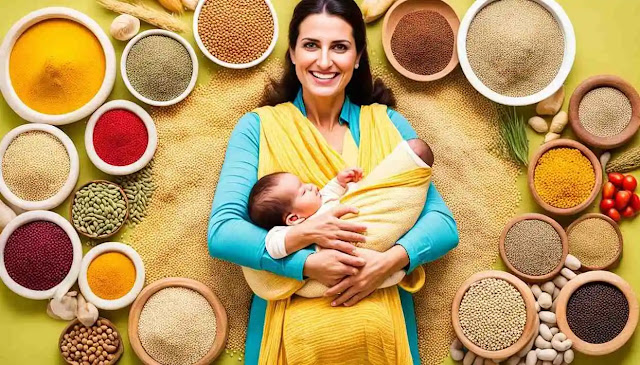1. Which Millets Should Pregnant Women Avoid?
 |
| Which Millets Should Avoid During Pregnancy |
Millet is an ancient grain that is cultivated in many African and Asian countries as well as in India. Millet is rich in vitamins, minerals, fiber and antioxidants and is low in calories. Millet is suitable for people with gluten intolerance, as millet is gluten-free.
 |
| Different Types of Millets |
Why millet is superfood for females
Millet is a healthy and nutritious option for pregnant women, as it offers numerous health benefits for mother and child. But there are also some expectant mothers who should avoid or limit millet during pregnancy, such as: Those suffering from thyroid disease or iodine deficiency, those suffering from mineral deficiencies and those who have allergies or sensitivities to millet to avoid any potential risks or complications. In this blog post, we will explore who should avoid millet during pregnancy.
Who Should Avoid Millet During Pregnancy
1.Females with Thyroid Disorder Or Iodine Deficiency:
Millet contains goitrogens, substances that can interfere with the thyroid gland’s function and cause goitre, a swelling of the neck due an enlarged thyroid. This can affect the metabolism and hormone balance of the mother and baby. Therefore millets should be avoided or limited by pregnant women with thyroid disorder or iodine deficiency.
 |
| Who Should Avoid Millets During Pregnancy |
2.Females with Mineral Deficiency:
Millets also contain phytic acid, an anti-nutrient that can reduce the absorption of minerals such as iron, zinc, and calcium from the food. This can cause mineral deficiencies and affect the growth and development of the baby. To reduce the phytic acid content, millets should be soaked at least 6 to 8 hours before cooking. You can use sprouted millets, or use fermented millets for cooking. However, females who already have mineral deficiencies should consult their doctor before consuming millets during pregnancy.
3.Females with Allergies or Sensitivities to Millets:
Millets can cause allergic reactions in some people, especially those who are sensitive to grasses or grains. Symptoms of millet allergy can include skin rashes, itching, swelling, breathing difficulties, and anaphylaxis. So, pregnant women who are allergic to millets should avoid them completely.
Which Millets Should Avoid During Pregnancy
Some millets may have adverse effects on the thyroid function, mineral absorption, or hydration levels of the mother and the baby. Therefore, it is important to know which millets to avoid or limit during pregnancy and why.
1.Kodo Millets:
Kodo millet is a type of millet that is high in protein, fibre, and antioxidants. It can help lower cholesterol, blood pressure, and blood sugar levels. But, kodo millet also has a high amount of phytic acid, an anti-nutrient that can reduce the absorption of minerals such as iron, zinc, and calcium from the food. This can cause mineral deficiencies and affect the growth and development of the baby.
Moreover, kodo millet can have a dehydrating effect on the body, as it increases the urine output and causes water loss. This can be harmful during pregnancy, as dehydration can cause complications such as preterm labour, low amniotic fluid, and foetal distress. Therefore, kodo millet should be avoided or limited by pregnant women, especially in the third trimester, when the fluid requirements are higher.
2.Karuppu Kavuni Rice:
Karuppu kavuni rice is a type of black rice that is native to Tamil Nadu, India. It is rich in anthocyanins, a type of antioxidant that can protect against oxidative stress, inflammation, and cancer. It also contains iron, calcium, and zinc, which are essential for foetal development.
However, karuppu kavuni rice also has a high amount of goitrogens, substances that can interfere with the thyroid gland’s function and cause goitre, a swelling of the neck due to an enlarged thyroid. This can affect the metabolism and hormone balance of the mother and the baby. Therefore, karuppu kavuni rice should be avoided or limited by pregnant women with thyroid disorders or iodine deficiency.
 |
| Millets During Pregnancy |
Millet Benefits During pregnancy
How to Consume Millets During Pregnancy
Millets have a rich nutritional profile that can support various aspects of pregnancy health.
To enjoy the benefits of millets and avoid the risks, pregnant women should follow some general guidelines when consuming them during pregnancy. Some of the recommendations of millets during pregnancy are:
1.Consult Your Doctor:
Before adding millets to your diet, consult your doctor or nutritionist to determine the appropriate amount and frequency of consumption. This will depend on your individual health condition, medical history, and nutritional needs.
2.Moderate Your Intake:
Millets should not be consumed in excess or as a sole source of nutrition during pregnancy. They should be balanced with other foods that provide protein, healthy fats, and other micronutrients. A moderate intake of millets can be around 1-2 servings per day, depending on your calorie and nutrient requirements.
 |
| How to Consume Millets During Pregnancy |
3.Prepare Them Properly:
Millets should be prepared properly to reduce the goitrogenic and phytic acid effects and enhance their digestibility and nutrient availability. Millets should be washed thoroughly, soaked for at least 8 hours, sprouted or fermented if possible, and cooked well before eating.
4.Vary Your Millet Types:
Millets come in different types, such as finger millet, pearl millet, sorghum, foxtail millet, and others. Each type of millet has its own nutritional benefits and drawbacks, so it is advisable to vary your millet types and not stick to one kind. This will help you get a variety of nutrients and avoid potential adverse effects.
 |
| Take Doctor’s Advise |
Conclusion
Millets are a nutrient-rich and gluten-free grain that can be a healthy addition to a pregnant woman’s diet. They offer several benefits for the mother and the baby, such as folate, iron, calcium, magnesium, B vitamins, fibre, and complex carbohydrates.
However, they also have some risks, such as goitrogenic, phytic acid, and allergic effects, that need to be considered and managed. Therefore, pregnant women should consult their doctor, moderate their intake, prepare them properly, and vary their millet types when consuming millets during pregnancy.
Author bio
Komal Balyan
A health blogger and health & nutrition content writer.having more then three years of experience. My expertise lies in creating informative content on topics such as nutrition, fitness, and wellness. 🌟
Feel free for commenting your experience &suggestion




